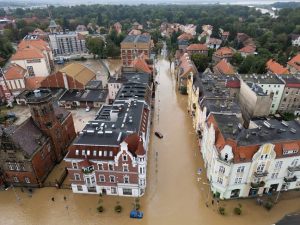Central European countries like Austria, Poland, the Czech Republic and Hungary have all been hit with extreme rainfall as Storm Boris sweeps through the region, dumping well over a month’s worth of rain.

No fewer than 10 people are reportedly killed in what has been described as the worst floods to hit central Europe in decades.
Indeed, people and communities across Central and Eastern Europe are suffering from the ongoing extreme rainfall and flooding caused by the Storm as five people have been killed and several unaccounted for due to flooding in Romania and the Czech Republic.
One person drowned in Poland and another, a firefighter, died during flood rescue in Austria.
Eight people were killed over the weekend, and two more died from flooding in Austria on Monday. The two men, aged 70 and 80, respectively were found dead by emergency services after being trapped in their homes.
In the Polish city of Nysa, patients from a local hospital, including pregnant women, had to be evacuated Monday after the city’s governor said the facility was no longer able to function properly.
The town of Klodzko is nearly entirely submerged under water with one of the town’s bridges entirely inaccessible. Floodwaters in the town are reaching as deep as 1.5 meters.
About 80% of buildings are submerged in the Czech town of Litovlje.
Poland’s Prime Minister, Donald Tusk, has declared a state of natural disaster.
Similarly, the province surrounding Vienna, Austria is declared a “disaster area” due to the “unprecedented extreme situation”.
This disaster is hitting Europeans as extreme climate impacts are devastating other regions around the world that include flooding in west and central Africa where more than 1000 people have died and many more had their homes destroyed.
Also, Typhoon Yagi is wreaking havoc in Asia with hundreds reported killed and Vietnam alone reporting damages of $1.6 billion; wildfires continuing to sweep across Brazil and the Amazon rainforest, as the region endures a record heatwave.
Nicolò Wojewoda, European Regional Director at 350.org, said: “This is yet another devastating wake-up call for world leaders and power brokers to take urgent and decisive action to tackle the climate crisis. We are witnessing ordinary people paying with their lives, right now, as decision-makers delay and obstruct climate action. How many more deadly disasters do they need to see in order to take necessary concrete steps to set policy and implement measures that end the suffering we are witnessing today?
“The people and communities suffering right now have been failed time and time again by ineffective leadership and a broken system that is rigged against them. This cannot and will not continue – because we won’t let it.
“Over the coming weeks the most powerful politicians and decision-makers will be gathering at a series of summits, conferences and negotiations to talk climate. We will be holding up this latest swathe of tragic and preventable disasters, as a measure to judge their actions not their words. And we will be organising to increase the pressure on them, to show them that half-measures and delaying tactics will not be enough to silence the growing call for climate justice”
As climate impacts hit and world leaders prepare for the UN climate negotiations (COP29), the G20 Summit and a round of important national budgets in countries like France, Germany and the UK, 350.org expresses the following measures for urgent implementation:
- A global agreement on a wealth tax and the implementation of national wealth taxes in countries like France, Germany and the UK – to raise billions in additional revenue for financing domestic and international climate solutions.
- Increased and permanent windfall taxes on fossil fuel companies.
- At COP29, all countries, especially wealthy ones benefiting from the climate crisis, need to honour their pledges. There is need for commitments to redirect trillions from fossil fuels to triple global renewable energy capacity by 2030, with projects that benefit communities everywhere.
